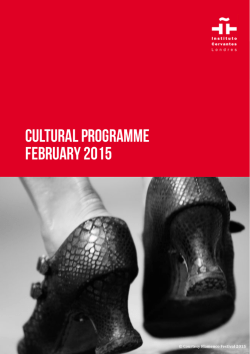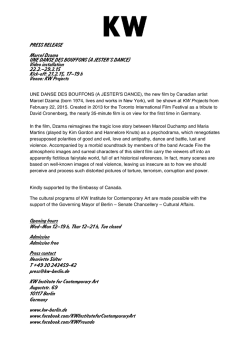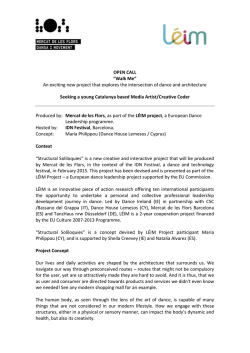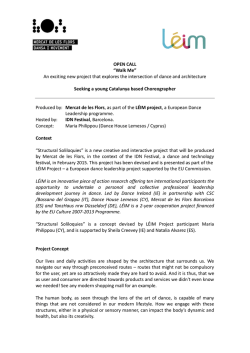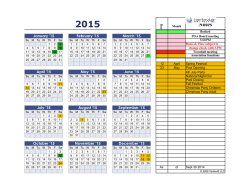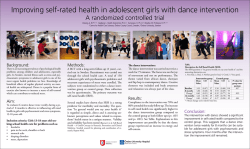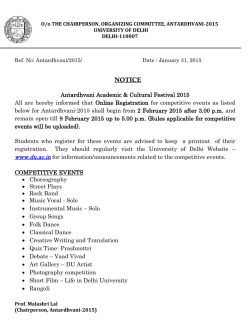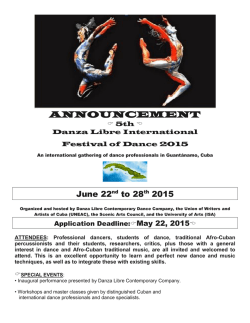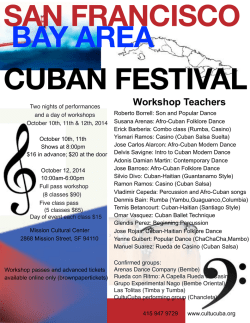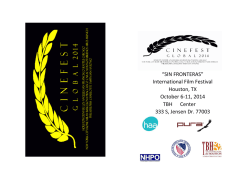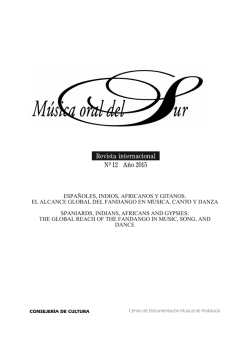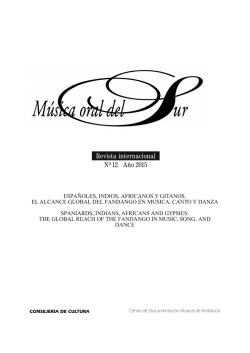
FLAMENCO, INDIA
FLAMENCO, INDIA DANCE THEATRE and music A DIALOGUE BETWEEN CULTURES CREATED & DIRECTED BY CARLOS SAURA 2 24 “Flamenco, India. DANCE THEATRE AND MUSIC” FLAMENCO, INDIA - DANCE THEATRE AND MUSIC An unprecedented exploration of the ties between flamenco and diverse music and dance forms of India in an aesthetic and professionally designed artistic collaboration directed by the legendary award-wining Spanish filmmaker and flamenco-dance drama director Carlos Saura. This Indo-Spanish state-of-the-art production showcases the best of flamenco´s passion and vibrancy in hand with the genius and richness of Indian dance and music traditions. This show will entice audiences with the most outstanding traits of each culture whilst highlighting the commonalities between two forms of expression, separated by thousands of miles yet bound by their shared use of music and dance as a means of connecting with the deepest roots of their respective traditions. “Is it possible to achieve a fusion between two cultures?” wonders Saura. A show like this will indeed demonstrate both the (undeniable) differences between them and the potential for such a communion. The project interweaves several cultural strands and embarks on a journey to India, the cradle of Gypsy culture, in order to discover new dance forms and a different understanding of music. Indian Dance and Music 3 24 “Flamenco, India. DANCE THEATRE AND MUSIC” Carlos Saura “With its rhythmic diversity and its flexibility — as well as its oriental reminiscences, especially from the Arab world and also from the Gypsies who migrated from Rajasthan to Spain (crossing the south of the Mediterranean) — flamenco is today prepared to walk along the road to a promising future. It is that flexibility that allows for the engagement of Indian musicians with certain rhythms in flamenco.” Flamenco 4 24 “Flamenco, India. DANCE THEATRE AND MUSIC” CARLOS SAURA Artistic Director 5 24 “Flamenco, India. DANCE THEATRE AND MUSIC” Carlos Saura Artistic Director Filmmaker, photographer and writer Carlos Saura’s career has been continuous and multifaceted. Films like The Hunt (Silver Bear for Best Director at the 16th Berlin International Film Festival), Anna and the Wolves or Cría cuervos/Raise Ravens (Special Jury Award at the 1976 Cannes Festival) are but a few examples of the kind of movies he directed during the 60s and 70s, while the early 80s marked a turning point in his filmmaking career. In 1981 he shot, in collaboration with Antonio Gades, the first of three titles that would eventually make up a musical trilogy where flamenco provided the cornerstone. Blood Wedding opened up a deeply personal new film genre that would find a continuation, two years later, in Saura’s adaptation of Bizet’s Carmen. Based on Falla’s ballet of the same title, Love the Magician is the final installment in this exploration of Spanish roots in whose international dissemination Saura became truly instrumental. Indeed the filmmaker’s passion for music and dance with strong roots in Spanish culture has crystallized in several films where these elements are given full protagonism: Sevillanas, Flamenco, Iberia or Flamenco, Flamenco all bear witness to Saura’s intense approach to Spanish culture. Apart from his film work and his direction of several operatic productions of Bizet’s Carmen, in 2013 Saura made his debut as a stage director with an adaptation of Calderón de la Barca’s play The Great Theatre of the World. www.clubcultura.com/clubcine/clubcineastas/saura 6 24 “Flamenco, India. DANCE THEATRE AND MUSIC” Carlos Saura AWARDS 1958 - Cuenca Special Mention - San Sebastian International Film Festival. 1965 - La caza Silver Bear for Best Director- Berlin International Film Festival. 1968 - Peppermint frappé Silver Bear for Best Director- Berlin International Film Festival. 1973 - Ana y los lobos Special Jury Award - Cannes International Film Festival. 1976 - Cría cuervos Special Jury Award - Cannes International Film Festival. Golden Globe Nomination Critics Award - Brusels International Film Festival 1979 - Mamá cumple cien años Special Jury Award - San Sebastian International Film Festival. 1981 - Deprisa, deprisa Golden Bear for Best Film- Berlin International Film Festival. 1985 - Carmen BAFTA Award for Best Film Not in the English Language 1994 - Sevillanas Rose d’Or - Montreaux Festival. 1997 - Pajarico Best Director Award - Montreal International Film Festival. 1999 - Tango Oscar Nomination for Best Film In Foreign Language. 2000 - Special Award for His Career- Karlovy Vary International Film Festival. The professional path of Carlos Saura is replete with honors from festivals all over the world. This is a short list of some of his primary achievements during a career that glistens with dozens of awards. 2004 - Special Award for His Career- European Film Academy. 2007 - El séptimo día Best Director Award - Montreal International Film Festival. 2007 - Honorary Golden Shell - San Sebastian International Film Festival. 2008 - Global Life Time Achievement Award - Mumbai International Film Festival. 2009 - Honorary Spike - Valladolid International Film Festival. 7 24 “Flamenco, India. DANCE THEATRE AND MUSIC” ARTISTS in Residence A show like the one opening at Valladolid’s Calderón Theatre requires intricate preparation work and logistics. For this reason the artists taking part in the production — both musicians and dancers — will live and work together during the months before the premiere so as to refine to the utmost this coming together of Indian dance and music with Flamenco staged by Carlos Saura. Valladolid will thus be a melting pot for all of them with this intercultural and multidisciplinary experience resulting in an innovative, vibrant and multicolored creation enriched by Saura`s cinematic vision. Valladolid will thus become a true home to talent and art, welcoming a selection of multi-talented artists from two cultures that are at the same time distant yet intimately close, in the run-up to the show hosted by Calderón Theatre in October 2015. 8 24 “Flamenco, India. DANCE THEATRE AND MUSIC” Artistic Team 9 24 “Flamenco, India. DANCE THEATRE AND MUSIC” ARTISTIC TEAM CARMEN CORTÉS Choreographer (Flamenco) Carmen Cortés, born in Barcelona with Andalusian roots, is one of the most prestigious personalities in contemporary Spanish dance, particularly in the genre of flamenco interpretation. She defines herself as a ‘bailaora’, whilst never renouncing other creative forms of dance and theater, with an unrelenting curiosity for renovation and a synthesis between flamenco and other styles of dance. The art of Carmen has reached a combination of duality that is difficult to achieve in the world of modern flamenco. Though her dance is orthodox and genuine in nature, Cortés easily incorporates with perfection fresh techniques that are a significant deviation from her classical foundation. Her interpretation of dance is passionately independent, constantly in search of innovation. The rules of flamenco shed their rigor and take on a new form through her creativity, while never losing a drop of purity. Her dance is elegant and tempered, strong and fragile, delicately fierce, singular, with unconditional surrender. www.carmencortes.es 10 24 “Flamenco, India. DANCE THEATRE AND MUSIC” ARTISTIC TEAM SANTOSH NAIR Choreographer (INDIA) Santosh Nair received his initial training in Kathakali from his father, Shri. Kalamandalam Padmanabhan, and later from Guru Sadanam Balakrishnan. He studied contemporary dance under Shri. Narendra Sharma and trained in Mayurbhanj Chhau, under Guru Janme Joy Sai Babu. He has performed widely in India and other countries, including the Modern Dance Festival in West Germany, the Big World Festival in Brazil, the Kalanidhi Festival in Toronto, he choreographed A Doll’s House and performed at Damini House of Culture in Oslo, Norway and The Motherland Project with Sampad –South Asian Arts, Birmingham. He also collaborated with eminent Austrian choreographer, Editta Braun and Solvi Edverdsen of Norway performing in Germany, Vienna, Salzburg and other European cities. He was invited as the Master Teacher in the Dance Intense program in Toronto, Canada, to conduct a movement workshop based on Mayurbhanj Chhau and choreographed Stealth for Sampradaya Dance Creations, which was showcased in Ottawa Dance Festival 2010. In 2011, he along with his company, showcased The Game of Dice in Kalanidhi Fine Arts Festival, Toronto, Canada and conducted a Mayurbhanj Chhau residency for the same. For the 2012 Cultural Olympiad in UK he was appointed as the Artistic Director, for the Moving Earth Project by Sampad, South Asian Arts, Birmingham, involving 240 artists. He premiered his company’s new production - The Mystical Forest in Toronto, Canada in March of that year. In 2013 and 2014 he performed Chhau at the Nrityarupa Festival of India in Latin America, Vietnam and South Africa under the aegis of the Sangeet Natak Akademi and the Indian Ministry of Culture. He has both performed and choreographed different projects for the ChamanLal Memorial Awards, Sahitya Kala Parishad and ICCR. http://www.sadhya.com/ 11 24 “Flamenco, India. DANCE THEATRE AND MUSIC” ARTISTIC TEAM MÓNICA DE LA FUENTE Choreographer (INDIA) A specialist in India’s performing arts, Mónica de la Fuente has devoted herself for the last 20 years to the creation and dissemination of the classical and contemporary dances of India. While living for 7 years in South India (1993-2000), she received her training in Bharata Natyam and Kathakali dance and theatre from the country’s most prestigious schools in the field of the performing arts: the Kalakshetra College of Fine Arts in Madras and Kalamandalam and Margi Kathakali in Kerala. Mónica was the first Spanish actress whose training in India was rewarded with scholarship grants from Spain’s Agency for International Cooperation (AECI) and the Indian Council for Cultural Relations (ICCR) of the Government of India. Additionally she has received awards and artists` grants from the Provincial Government of Valladolid, Municipal Foundation for Culture of Valladolid, as well as the Regional Government of Castile and Leon. In 2000 she founded her own dance theatre company in Spain and since then has performed at numerous festivals and theatres in India, Europe, and USA, where she taken her Indian classical dance shows as well as contemporary creations in experimental dance-theatre. In the field of contemporary dance, her choreographies include Laya Chitra (2008) which was created for the Métis Festival in Saint Denis with Ravi Prasad, France, and La voz del cuerpo (2013), which premiered at Madrid’s Círculo de Bellas Artes and was then staged at international festivals like FACYL in Salamanca. She has moreover choreographed for operatic productions —Bizet’s The Pearl Fishers and Puccini’s Edgar— and indo-flamenco creations such as Roots, Living Traditions: Flamenco-India, an Indo-Spanish production for the Ahmedabad Heritage Festival (2009), Indalusia with renowned flamenco-jazz musician Jorge Pardo in Qatar (2011), as well her own productions Flamencarnatic and Rasa- Duende with support from the Spain`s Public Agency for Cultural Action (AC/E) premiered at International Film Festival of Kerala (2014) and Hawa Mahal at Jaipur Literature Festival (2015). She has also formed an artistic partnership with musician Ravi Prasad and currently runs regular courses on dance and movement at the Espace Ravi Prasad in Toulouse and Casa de la India, Valladolid. www.monicadelafuente.com 12 24 “Flamenco, India. DANCE THEATRE AND MUSIC” ARTISTIC TEAM RAVI PRASAD Music Director (INDIA) Born in Kerala and based in France, Ravi Prasad is a versatile musician and composer whose brilliant career in music (since he left India over 30 years ago) has included compositions for several music ensembles and in styles as varied as jazz, flamenco, orchestral music, electroacoustic music, ethnic music, etc. In 1990 he formed the vocal ensemble Padhani and invented the concept of Indian polyphony. In 1996 he directed and composed Mythia, an Indian symphony combining the jazz, classical and flamenco styles, which he premiered at the UNESCO Palace and at the Olympia in Paris on the occasion of the UN’s 50th anniversary. He has published over twenty CD albums including Devi (1993), Ithal (1995), Pooja (1996) or Mythia (1996) and has authored a comprehensive discography in dialogue with many musical styles. For over ten years Prasad has worked with flamenco artists in several stage productions and albums such as Del Ganges al Guadalquivir (1999) with flamenco guitarist Pedro Soler; Tandem, with guitarist Kiko Ruiz; and Flamencarnatic (2014) with singer José Salinas. Loving also experimental sounds, he collaborated with artists such as DJ Goze (compilation Buddha Bar III) and Talvin Singh (Festival de Saint Denis, Opera of London, Theatre des Champs Elysees). He has worked in partnership with French choreographer Régine Chopinot on three productions along with the Atlantic Ballet (Festival of Hue in Vietnam, the Avignon Festival, and India tour), and also experimented with the legendary musical tradition from his country in Malbar Experience in collaboration with musicians from the Réunion Island, and in Ponguël musical theatre in which he also acts. Since 2008 he has collaborated with actress and dancer Mónica de la Fuente in the staging of several shows of contemporary Indian music and dance: Ramayana, un viaje cien rupias for Valladolid’s International Festival of Street Theatre and Arts (TAC); Laya Chithra, the Image of the Melody, created for the Métis Festival held in Saint Denis; and La voz del cuerpo (2013). His latest works include Scandicus, which features a male choir of early music (2011), and Resonances...(2012) music under poetic influence, where Prasad experiments with sound and video in collaboration with Philippe Gal, Marie Dillies and Luc Aribaud. Ravi Prasad has set up a cultural centre in the heart of Toulouse, the “Espace Ravi Prasad”, where he develops both his teaching activity and his artistic creations. In parallel to that, he organizes festivals and music events aimed at promoting cultural exchanges in India, such as the 2012 festival held at Thrissur sponsored by the Fondation Coupleux-Lassalle and the Cumulus Association (Paris). www.raviprasad.net www.espaceraviprasad.com 13 24 “Flamenco, India. DANCE THEATRE AND MUSIC” ARTISTIC TEAM GERARDO NÚÑEZ Music director (flamenco) Both a composer and performer, his music is complex and rich, with a unique style. He is undoubtedly one of the best composers of flamenco fusion due to his remarkable sense of innovation. He learned to play guitar when he was 11 years old in his native Jerez. He began accompanying the best singers of the region at the age of fourteen. From that moment on, his career has been unstoppable until ultimately becoming one of the best musicians of Spain. A technical guitarist, he is considered one of the most advanced in creating such precision and brilliant execution. He explores other genres in music, such as rock, classical and particularly jazz starting from the 80’s, however, never parting from his origins in flamenco. What originally began as a daring project led to the beginning of an adventure during which he ultimately won over the public in the United States. During his extensive career, he has collaborated with the likes of Mario Maya, Dave Thomas, Paquito D’Rivera, Tomás San Miguel, including writing the music for his wife Carmen Cortés’ performances. The sound of his guitar has accompanied stars such as Plácido Domingo, Teresa Berganza, Rocío Jurado, Arto Tuncboyaciyan, Danilo Pérez, John Patitucci, Enrico Rava, Joaquín Sabina, etc. The list is endless. In 1987 he started the recording label, El Gallo Azul, which also is the title of his first album of several to follow, particularly Jucal and Calima, among others. The label has also launched the careers of many young artists. Lorca’s Yerma premiered in 1996, directed by Nuría Espert for the Carmen Cortés Dance Company, and went on tour in Spain, France, Italy and Finland. Salomé, debuted in 1998 at the Mérida Classical Theater Festival under the direction of Gerardo Vera and the Carmen Cortés Company. During the same year Eberhard Weber (double bass), Richard Galliano (accordion), Enrico Rava (trumpet) and Gerardo Núñez formed a quartet that performed in Germany and Italy. Núñez also recorded in the United States with Danilo Pérez, John Patitucci and Arto Tuncboyaciyan. That same year, the Symphony For a New Theater, written and premiered for the inauguration of Barcelona’s “Teatre Principal”, was performed by Barcelona’s Orquesta Ciudad Condal (City of Counts Orchestra) and revived by the Córdoba Orchestra at the Engineering School of Seville. www.gerardonunez.com 14 24 “Flamenco, India. DANCE THEATRE AND MUSIC” 15 24 “Flamenco, India. DANCE THEATRE AND MUSIC” ARTISTIC TEAM CARLOS SAURA MEDRANO ASSISTANT DIRECTOR Saura Medrano began his professional career in the world of film after graduating in Communication Science (Image). Since then he has devoted himself to script-writing, directing and feature-length production. As a film director he has shot several commercials, the documentary feature Marathon on the Barcelona Olympic Games (second unit director) or the featurette Buscando a Salomé. In 1999 he directed the long feature ¿Tú qué harías por amor? (Just Run!). His latest directorial jobs have been his TV coverage of the Africa Eco Race and the documentary films A quién le importa and Un año junto a Carlos Saura, currently in preparation. As an executive producer, he has worked in the following films: Salomé, Di que sí (Say I Do), The Hidden, Miguel and William, Fados, Sinfonía de Aragón, Io Don Giovanni and Carlos Saura’s Flamenco, Flamenco. With the latter he has worked as assistant director in film productions like Carmen, El Dorado, Flamenco or Goya in Bordeaux. Saura Medrano has authored the screenplays for El sueño de la razón, El otro hombre, and El último or Un caballo para un sueño. www.tresmonstruos.com 16 24 “Flamenco, India. DANCE THEATRE AND MUSIC” 17 24 “Flamenco, India. DANCE THEATRE AND MUSIC” Carlos Saura’s drawing shows the stage designs for this production —the space where music performers and dancers will materialize the encounter and dialogue between the two cultures. 18 24 “Flamenco, India. DANCE THEATRE AND MUSIC” 19 24 “Flamenco, India. DANCE THEATRE AND MUSIC” It is only natural that such an India-focused artistic project should involve the outstanding participation of Casa de la India in Valladolid, one of three Indian cultural institutions that exist in Europe supported by the Indian Council for Cultural Relations. The goal of Casa de la India is to promote and disseminate India’s culture as an efficient tool in strengthening the relations between India and Spain. This cultural centre aims at meeting the needs —cultural as well as institutional and economic—of Indo-Spanish relations. In this way, it helps promote the huge and varied potential of India in the Spanish context and facilitates greater exchanges and strengthen relations between the two countries. Valladolid’s Casa de la India was created as a cultural foundation in 2003 by the Government of India (through the Embassy of India), the City Council of Valladolid and the University of Valladolid, and operates from its centre housed in a heritage building in the heart of Valladolid. The Casa de la India is therefore a focal point for bilateral and multilateral relations with India in Spain and Southern Europe. In this way, the institution has managed to consolidate itself as a unique platform also for entrepreneurial projects and civil society cooperation between India and Spain in the new global world of the twentieth century. 20 24 “Flamenco, India. DANCE THEATRE AND MUSIC” 21 24 “Flamenco, India. DANCE THEATRE AND MUSIC” Suffused with History, the century-old building of Calderón Theatre has hosted performances by the great figures of the Spanish stage ever since it opened on 29 September 1864, as well as becoming in the course of time an indispensable cultural venue for Valladolid and a source of pride for the local population. With a performance calendar open to all kinds of genres, the Calderón Theatre offers audiences a combination of classicism and modernity, spectacle and 22 24 “Flamenco, India. DANCE THEATRE AND MUSIC” 23 24 “Flamenco, India. DANCE THEATRE AND MUSIC” For over 24 years, Teamwork has presented the finest of Indian writers, artists and performers to our nation and to the world. In countries such as Australia, Canada, Egypt, France, Germany, Hong Kong, Italy, Israel, Singapore, South Africa, Spain and USA, Teamwork produces over 23 highly acclaimed performing arts, visual arts and literary festivals. A distinctly versatile entertainment company, Teamwork has roots in the performing arts, social movement, and the corporate world. Our expertise lies in the areas of entertainment such as television, film – documentary and feature, and the creation and development of contemporary performing arts, visual arts & literary festivals across the world. We strongly believe in nurturing new talent across all art forms. Teamwork produces one of the world’s largest literary gatherings, the annual Jaipur Literature Festival. Our musical extravaganza, Bollywood Love Story – A Musical, continues to tour the world and has had sold out shows in Austria, Germany, Netherlands, South Africa, Spain and Switzerland. Our International festivals in India have included the bi-annual Bonjour India, festival of France with more than 200 events across 18 cities in India. The OZ fest – a festival of Australia in India and India by the Nile in Egypt have also been produced as part of our international festivals. Within India, the annual Mahindra Excellence in Theatre Awards (META) and the Ishara International Puppet Festival have been extremely successful. The arts of India, unrivalled in their cultural diversity and creativity, provide a challenge to showcase. This requires a deep understanding of our culture, an acute sense of relevance in programming, and an unflinching attention to organizational detail. Above all, we at Teamwork believe in respect for the arts and the artists. FLAMENCO, INDIA DANCE THEATRE AND MUSIC PRODUCED BY
© Copyright 2026
